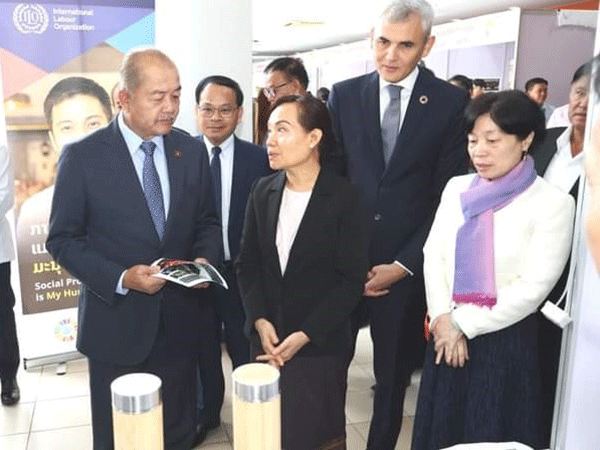Govt hosts national symposium on social protection
The government on Tuesday hosted the first national symposium on social protection, with talks centering on ways to address the many challenges facing rural and informal sector workers.
 |
| Deputy PM Prof. Dr Kikeo Khaykhamphithoune (left) attends a national symposium on social protection. |
Titled “Protection of non-regular workers and rural residents under the national social protection strategy”, the meeting comprised discussions between policymakers, practitioners, and development partners.
There were also forums, stage plays, and short documentaries that show citizens’ understanding of the benefits they receive from social protection and their expectations from the public sector.
Exhibits at the conference highlighted relevant policies as well as opportunities for increased discussion and understanding.
Minister of Labour and Social Welfare, Mrs Baykham Khattiya, was among those attending the symposium.
Speaking at the event, UN Resident Coordinator Representative to Laos, Mr Bakhodir Burkhanov, said investing in social protection can help accelerate progress towards the sustainable development agenda, and that social protection contributes to several of the Sustainable Development Goals, including universal health coverage, decent work, and policies for better equity.
Mr Burkhanov said initiatives such as the Global Accelerator on Jobs and Social Protection for Just Transitions, launched by the UN Secretary-General in 2021, signal the UN system’s response to accelerating progress towards the Sustainable Development Goals by creating decent jobs and expanding social protection.
Also speaking at the symposium, Deputy Prime Minister Prof. Dr Kikeo Khaykhamphithoune said one of the objectives was to increase the importance of social protection in policy making and the budget decision-making process.
The transition from external capital to internal capital mobilisation is essential for the effective implementation of the strategy, he added.
Most people in Laos work in the agriculture sector where they are mostly employed informally, with 86 percent of workers engaged in agriculture, forestry and fishing.
This sector, which employs approximately 1.4 million people, is facing low and uneven incomes, poor working conditions, and a lack of adequate social protection
However, the budget allocation for social protection in Laos is one of the lowest in the ASEAN region, accounting for only 1.6 percent of GDP.
Prof. Dr Kikeo said the forum will drive the strategy to stabilise the agricultural economy and protect vulnerable groups from the inequality of informal employment.
Ensuring that Lao citizens are not left behind, especially in times of crisis and hardship, is our priority, he added.
The government adopted the national social protection strategy in April 2020, showing the state’s commitment to reducing poverty and promoting equitable socio-economic development.
The strategy has three main pillars: health insurance, social insurance and social welfare, and aims to ensure that by 2030 all Lao citizens have access to necessary services under the principle of “leaving no one behind”.
By Phetphoxay Sengpaseuth
(Latest Update August 2, 2024)
|


